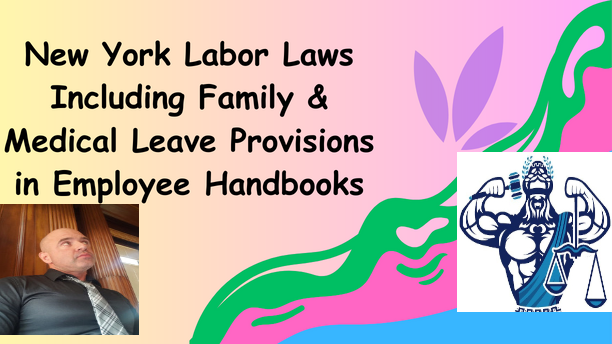Here at the Law Office of Vincent Miletti, Esq. and the home of the #UnusuallyMotivated movement, we take pride as a resilient and dependable legal services firm, providing such services in both a traditional and online, web-based environment. With mastered specialization in areas such as Employment and Labor Law, Intellectual Property (IP) (trademark, copyright, patent), Entertainment Law, and e-Commerce (Supply Chain, Distribution, Fulfillment, Standard Legal & Regulatory), we provide a range of legal services including, but not limited to traditional legal representation (litigation, mediation, arbitration, opinion letters, and advisory), non-litigated business legal representation and legal counsel, and unique, online legal services such as smart forms, mobile training, legal marketing, and development.
Still, here at Miletti Law®, we feel obligated to enlighten, educate, and create awareness about how these issues and many others affect our unusually motivated® readers and/or their businesses. Accordingly, in order to achieve this goal, we have committed ourselves to creating authoritative, trustworthy, & distinctive content, which looks to not only educate, but also deliver in a manner that only Miletti Law® can. Usually, this content is featured as videos posted on our YouTube Channel https://www.youtube.com/channel/UCtvUryqkkMAJLwrLu2BBt6w and blogs that are published on our website WWW.MILETTILAW.COM. With the ball in your court, yours is an effortless obligation to subscribe to the channel and sign up for the Newsletter on the website, which encompasses the best way to ensure that you stay in the loop and benefit from the knowledge bombs we drop here!
As the authoritative force in Employment Law, we are committed to ensuring that we live up to our word by keeping you in the loop, informed, and enlightened about various legal and non-legal issues related to labor law. Through our ongoing series, we have provided you with crucial information on how to enforce restrictive covenants and protect trade secrets. To ensure that we keep you in the loop, this blog is Part IV of our abridged series titled “Fundamental Aspects of Restrictive Covenants.” In Part III, we provided you with a hands-on guide on “How to Determine the Employer’s Legitimate Protectable Interests.” To move the discussion forward, this blog and Part IV of the series is an overview of “Understanding Reasonable Geographic Restrictions for Covenants.” Time restrictions will be discussed in an upcoming blog.
How to Understand Reasonable Geographic Limitations for Restrictive Covenants
The law requires non-competition agreements to be reasonable in geographic restrictions for them to be enforceable by employers. While most of these restrictions are governed by state common laws, there are, in some states, specific statutory presumptions concerning what geographic restrictions meet the reasonability standard. Thus the specific facts must form the basis for the analysis of a restrictive covenant’s geographic scope. This implies that there are significant variations regarding a given set of circumstances and by state when it comes to what entails reasonable geographic restrictions for a restrictive covenant.
Designing Geographic Restriction Considerations
Every employer should, when designing a geographic restriction, consider the question of whether the agreement in question will be reformed (or “blue-penciled”) by the state at issue to ensure the enforcement of an otherwise overbroad geographic restriction. The wholesome rejection of a restrictive covenant can result from an only marginally overbroad geographic limitation, particularly in states where blue-penciling is not allowed. On the contrary, employers should focus on conveying the parties’ intent concerning the severability of the limitation in those states where blue-penciling may be allowed by courts.
Considering Mileage Boundaries
The equation of geographic restrictions of a restrictive covenant can be expressed in terms of mileage or territory boundaries. When the former is adopted, an employer who wishes to utilize mileage boundaries should use specific criteria to justify the rationale behind the choice of a given distance. On a similar note, specific criteria should be given as justification for why the employer decided to choose the latter.
Drafting Territorial Restrictions
In most courts, restrictive covenants are enforced if only they restrict the geographic limitation to a region within the scope of the responsibility of the employee or where the employee carried out employment duties/worked. Generally, the employee’s position and the nature of the business in question comprise the two most significant determinants of geographic restrictions’ reasonableness. For instance, as opposed to a lower-level employee, a court may find that a high-level employee, such as an executive, has a wider geographic restriction. Notably, provided that there exists a substantial relationship between a specifically-defined client base and an employee, some courts could refuse to enforce location-based but allow client-based restrictions.
One interesting thing to note is that courts have been faced with broader geographic restrictions because today, customers are being sought far beyond the physical facility or facilities of the employer, and businesses have expanded onto the internet. This means that a court may hold a worldwide restriction to be reasonable where a former employer does worldwide business transactions. However, it is also crucial to note that an employer must provide justification beyond working in the computer fields/Internet or simply selling products on a website for a court to be convinced that such an employer requires a worldwide restriction, mainly because such situations are rare.
In the next blog under this series, which will be Part V, we will move the discussion forward through a discussion concerning “Understanding Reasonable Time Restrictions for Covenants.”
Until then, stay tuned and enjoy the series to come. In the interim, reach out to us with questions or comments on our website at the Contact Us page!
Always rising above the bar,
Isaac T.,
Legal Writer & Author.
 314-648-2586
314-648-2586 CALL US NOW
CALL US NOW








